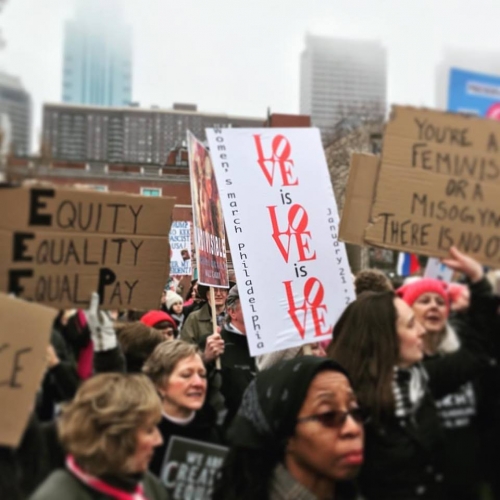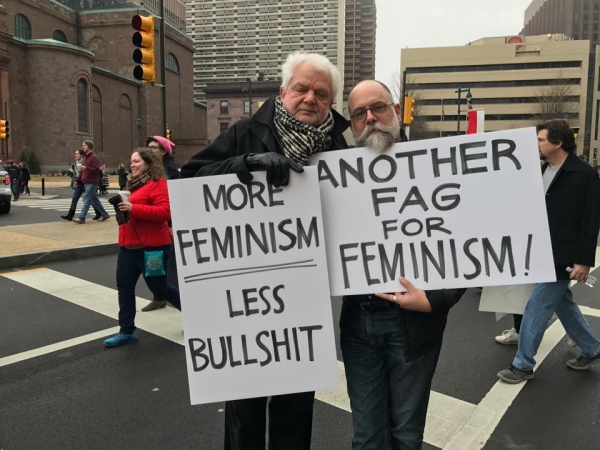Emily Cooper Morse found the Women’s March on Washington online almost immediately after the presidential election results came in favor of Donald Trump. Her best friend lives in the nation’s capital, so she planned to protest with her. Opponents of Trump see his administration as hostile to women, the LGBT community, people of color and many others.
But then Cooper Morse noticed another discussion happening online between women and men in her hometown of Philadelphia. Many said they couldn’t afford to go to Washington or would have trouble brining their kids on the trip. There wasn’t yet a march scheduled in Southeastern Pennsylvania.
“For eight years, I listened to President Obama say over and over again, change only happens when ordinary people get involved … ” Cooper Morse said from the stage in front of the Philadelphia Museum of Art. “I’m an ordinary person who hadn’t turned those words into action.”
She decided to start a Facebook event for a Women’s March on Philadelphia to coincide with the one in Washington on Jan. 21, the day after the inauguration.
“I wanted to see if I could just get a couple hundred people in a park marching in solidarity,” Cooper Morse said as the nearly 50,000 people lining the Benjamin Franklin Parkway laughed and applauded.
She noted that the Women’s Marches here and across the country were taking place almost 100 years to the day after Alice Paul chained herself to the White House to demand women’s suffrage from President Woodrow Wilson. She said the 2017 marches demand not only equality to men, but among women as well.

State Rep. Donna Bullock, a Philadelphia Democrat, addressed the largely white crowd with a message of making feminism more inclusive. She said she heard from black women who didn’t want to come to the Women’s March on Philadelphia because they didn’t feel welcome.
“Now let’s just talk about it, right, because we have to … ” Bullock said. “Many of us still feel like we’re not a part of this community called feminism.”
She talked about Sojourner Truth’s famous 1851 “Ain’t I a Woman” speech.
“When she gave her speech, she talked about how she could plow a field as hard as any man,” Bullock said. “She was talking about equal pay. When she gave that speech, she talked about how she bore 13 children just to see them sold off in slavery. That’s reproductive justice, people.”
Bullock added, “We must listen and continue to listen to each other and be open to each other.”
She emphasized that people should continue to come together to build resistance to policies that oppress their fellow Americans.
Philadelphia Mayor Jim Kenney also had some advice for march attendees. He said anyone feeling hopeless in the current political climate should volunteer for an organization or a cause they are passionate about.
He also announced his intention to sign a wage-equity bill that city council passed last year. It would ban employers from asking job candidates about their salary histories. Although similar laws exist elsewhere at the state level, this bill would be the first of its kind in an American city.
“Remember, we got through World War II,” Kenney said. “We can get through this. Never give up hope.”
Hopefulness was a word that attendees used repeatedly to describe the mood at the Women’s March on Philadelphia.
Tyler Read, of Oxford in Chester County, felt very positive being surrounded by supporters of America’s diversity. Read wore a transgender pride flag to the event.
“I think it’s valid,” Read said. “People shouldn’t be able to be discriminated against based on who they are.”
Read plans to continue to be out and visible while in high school to foster understanding among the students.
Loretta Tocci of South Philadelphia posed for a photo in front of City Hall while walking to the rally. She held a rainbow sign that said, “Women’s Rights are Human Rights.” Tocci said, after the march, she would get started sending emails, letters and phone calls to elected officials in the tri-state area, especially the Republican ones. She wants them to consider opposing Trump’s cabinet picks among other things.
David Zinn and Mikael Eliasen also joined the march. The Center City couple has been together for 17 years. Eliasen said being with Zinn inspired him to get more involved in community action.
Zinn said they want to “support people who are under attack with this horrible cabinet.”


